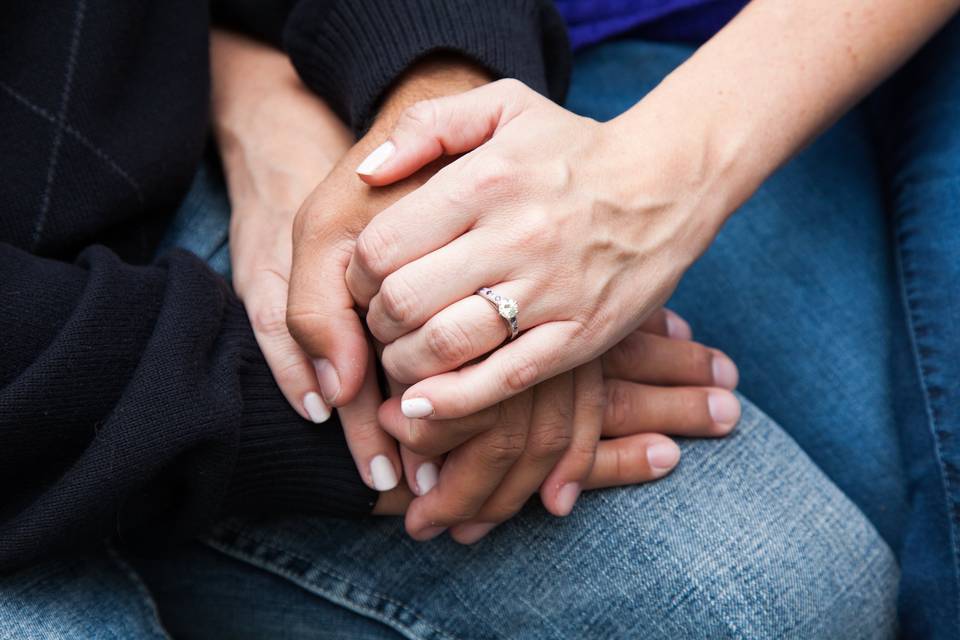How to Cope Emotionally If COVID Impacted Your Wedding
If you’ve had to reschedule your wedding due to the coronavirus pandemic, we’re here for you. Here, experts share how to work through your (totally normal!) feelings.


If you recently had to move your wedding because of COVID-19, you’re understandably upset. The entire wedding industry, as well as nearly every other industrial sector, is on pause for the time being and many events have been impacted. While you’re likely trying to stay strong and remind yourself of all of the reasons you should feel grateful during such a time of crisis, it’s more than okay to grieve the loss of your original wedding date, and likely many previously planned details that may no longer come to fruition at all.
“You may have waited such a long time for this experience, put down a deposit, done all of the planning and even told (and perhaps invited) your loved ones,” says Paulette Sherman, Psy.D., author of Marriage and the Law of Attraction and the host of The Love Psychologist Podcast. “All of a sudden, with no warning, everything is on hold and no one can tell you when things might be normal again.”
If you’re feeling anxious, depressed, overwhelmed, or any other strong emotion, it’s important to acknowledge it and give yourself time to process how you are feeling. “When you push ahead too soon without acknowledging what you’re feeling, those feelings can resurface later and come back even stronger, which makes it more difficult to cope,” warns Emily Guarnotta, licensed clinical psychologist and blogger at The Mindful Mommy. “Processing your emotions can involve talking with a supportive loved one, like your partner, journaling, practicing meditation, or just making an effort to calmly sit with your own thoughts about the situation.”
If you’re having a difficult time coping with COVID-19 throwing a wrench in your wedding plans, these expert-approved tips can help you manage and move forward.
Give yourself permission to feel your emotions.
As mentioned, it’s important to acknowledge how you are feeling instead of pushing your emotions to the side. “If other people are encouraging you to move on before you’re ready, remind them that you need some time to process what is happening and when you’re ready you will move on,” says Dr. Guarnotta.
Try to notice and control your thoughts.
This can be difficult, especially when you’re stressed out about something, but try your best not to let your mind focus on the negative. “If you notice that you’re worrying about things that have not yet happened or that you have no control over, take a step back and ask yourself if it’s productive or helpful to have these thoughts,” says Dr. Guarnotta. “If the answer is no, try to redirect your attention to something else that you do have control over.”
Take to journaling.
Writing down your thoughts, feelings and emotions can be tremendously useful for helping you sort through periods of high stress, sadness or anxiety related to your rescheduled wedding. “It can help you make sense of chaotic times and it can be a safe and private repository of all those feelings that need a place to be expressed and remembered,” says Dr. Sherman. “You can look back upon it once this pandemic is over to remember what you went through during this time and when it passes you can later write the chapter of how you and your partner worked through it and how it turned out.”
Meditate.
Research, including one study published in JAMA Internal Medicine, has linked meditation to a reduction in anxiety and depression. The practice involves sitting in a quiet place free from distraction and focusing your mind on a peaceful thought. “This takes you to a place of inner peace and equilibrium and gives you a way to quiet negative thinking and reminds you that even if you can’t control the outer circumstances that you can choose your reaction to them and decide where to put your focus,” says Dr. Sherman.
Reach out to your support system.
Don’t hesitate to reach out to the important people in your life for support, including your friends, your family and your spouse. While many of these individuals may also be coping with emotions involving your rescheduled wedding, they may not realize just how strongly it’s affecting you. Asking for help and then allowing them to do their part can help ease some of the burden on you and remind you that you’re not alone in how you’re feeling, notes Dr. Guarnotta.
Enlist the help of a professional.
If you’re not currently utilizing the professional help of a therapist or a life coach, there’s truly no time like the present to start. “It’s great to have a nonjudgmental supportive person to support you during a stressful time,” says Dr. Sherman. “Having someone removed from the immediate situation may be helpful and may take some pressure off your significant other and loved ones.”





